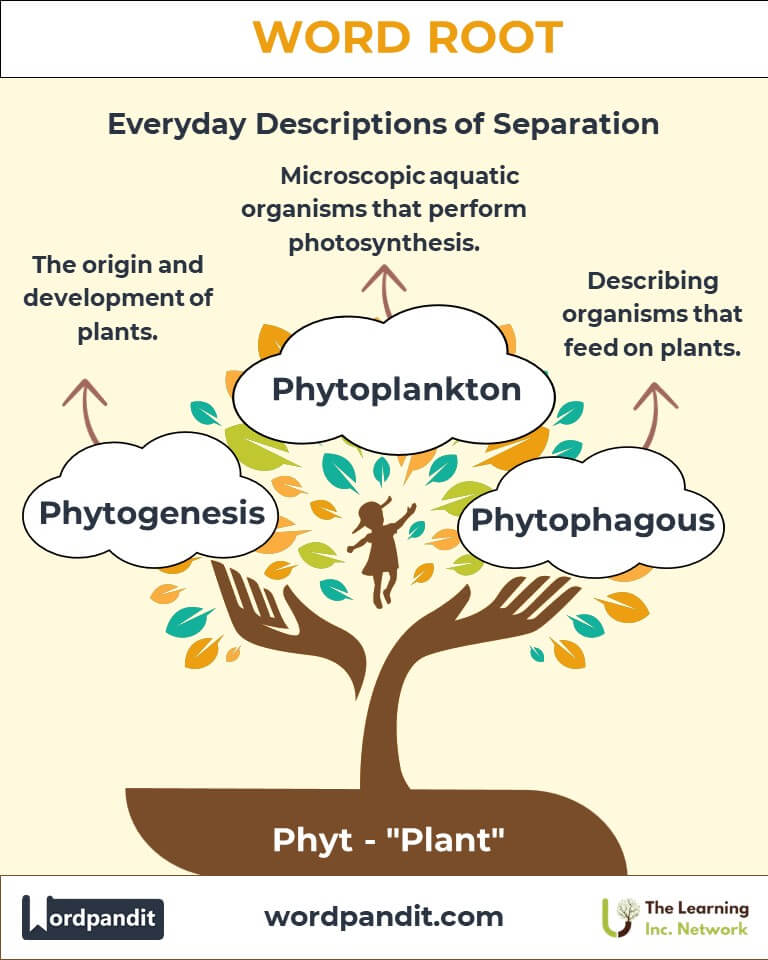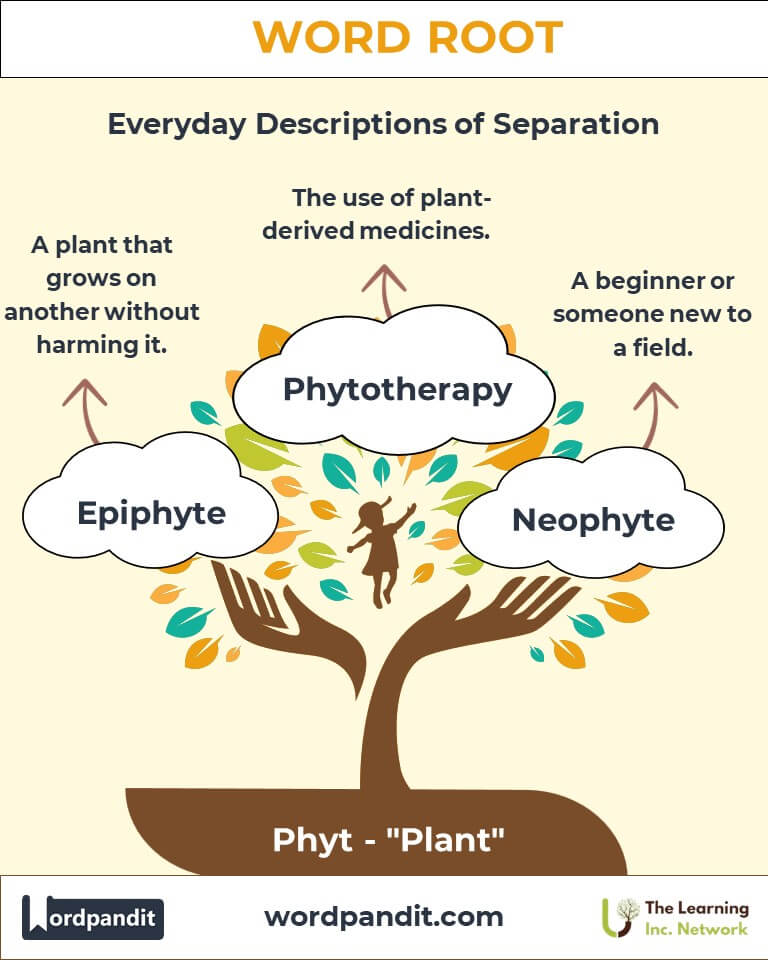Phyt: The Root of Life and Growth in Nature
Byline:
Discover the versatile and vibrant root "Phyt," originating from the Greek word "phyton," meaning "plant." From microscopic organisms like phytoplankton to terms like neophyte that signify growth and learning, "Phyt" connects us to the world of flora and the essence of nurturing and development.

Table of Contents
- Introduction: The Essence of Phyt
- Etymology and Historical Journey
- Mnemonic: Unlocking the Power of Phyt
- Common Phyt-Related Terms
- Phyt Through Time
- Phyt in Specialized Fields
- Illustrative Story: Phyt in Action
- Cultural Significance of Phyt
- The Phyt Family Tree
- FAQs About the Phyt Word Root
- Test Your Knowledge: Phyt Mastery Quiz
- Conclusion: The Living Legacy of Phyt
Introduction: The Essence of Phyt
What links the green world of plants to growth and learning? The root "Phyt" (pronounced "fite") bridges these ideas. Derived from the Greek word "phyton," meaning plant, it finds its way into scientific, educational, and everyday vocabulary. Whether referring to tiny phytoplankton that sustain marine ecosystems or a neophyte starting fresh in a new field, "Phyt" symbolizes life, growth, and potential.

Etymology and Historical Journey
The root "Phyt" comes from the Greek word "phyton," signifying "plant" or "growth." In ancient Greek thought, plants represented the foundation of life and sustenance, a perspective carried forward as the term entered scientific taxonomy. Over time, "Phyt" became integral to words describing plants and growth-related concepts, influencing both biological studies and metaphoric language.
Mnemonic: Unlocking the Power of Phyt
To remember "Phyt," imagine a sprouting seed growing into a lush, green plant. The root "Phyt" evokes images of flourishing life, connecting nature and nurture.
Mnemonic Device:
"Phyt grows life: from tiny plankton to towering trees."
Common Phyt-Related Terms
- Phytoplankton: Microscopic organisms that float in water and perform photosynthesis.
Example: "Phytoplankton are the base of the marine food chain, supporting countless species." - Neophyte: A beginner or someone new to a field or activity.
Example: "The neophyte gardener sought advice on planting her first vegetable patch." - Phytogenesis: The origin and development of plants.
Example: "Studies in phytogenesis help us understand how plants evolved over millennia." - Epiphyte: A plant that grows on another plant without harming it.
Example: "Orchids and bromeliads are common epiphytes in rainforests." - Phytophagous: Describing organisms that feed on plants.
Example: "Phytophagous insects play a significant role in shaping plant evolution." - Ancient Roots: Greek naturalists used "phyton" to describe all plant life, emphasizing its fundamental role in ecosystems.
- Modern Science: Terms like "phytoplankton" underscore its relevance in understanding Earth's biosphere.
- Cultural Growth: "Neophyte" illustrates the metaphorical connection between plants and human growth.
- Ecology: Epiphytes demonstrate mutualistic relationships.
Example: "Epiphytes thrive in tropical forests, absorbing moisture from the air." - Agriculture: Phytopathology helps combat plant diseases.
Example: "Advances in phytopathology help farmers combat crop-destroying pathogens." - Marine Biology: Phytoplankton maintain marine ecosystems and oxygen production.
Example: "Phytoplankton blooms are indicators of ocean health." - Phyto- (Greek: plant):
- Phytoplankton: Tiny aquatic plants.
- Phytophthora: A genus of plant-destroying pathogens.
- Neo- (Greek: new):
- Neophyte: A beginner.
- Neonatal: Pertaining to newborns.
- -Phagous (Greek: eating):
- Phytophagous: Plant-eating.
- Sarcophagous: Flesh-eating.
Phyt Through Time
Phyt in Specialized Fields
Illustrative Story: "Phyt" in Action
In a small coastal village, marine biologist Dr. Elena studied phytoplankton blooms to understand their impact on fisheries. Meanwhile, her young daughter, a neophyte gardener, tended to her first flower patch. Inspired by her mother’s work, the girl learned about the interconnectedness of life—how the tiniest phytoplankton in the ocean supported the towering trees on land. Together, they celebrated "Phyt" as a symbol of growth and harmony.
Cultural Significance of "Phyt"
The root "Phyt" reflects our profound connection to the plant world. In many cultures, plants symbolize life, renewal, and resilience. Festivals celebrating harvests or spring growth highlight humanity’s reverence for flora. Additionally, words like "neophyte" remind us that growth, whether personal or ecological, begins with humble roots.

The "Phyt" Family Tree

FAQs About the "Phyt" Word Root
Q: What does "Phyt" mean?
A: "Phyt" originates from the Greek word "phyton," meaning "plant." It is used to describe terms related to plants, growth, and biological development, symbolizing life and nature.
Q: What are phytoplankton, and why are they important?
A: Phytoplankton are microscopic organisms that perform photosynthesis in aquatic environments. They form the base of the marine food chain and are responsible for producing nearly 50% of Earth's oxygen.
Q: What is a neophyte, and how is the term used metaphorically?
A: A neophyte is someone new to an activity, field, or skill, much like a young or budding plant. Metaphorically, it represents fresh beginnings and growth potential.
Q: How are epiphytes different from parasitic plants?
A: Epiphytes grow on other plants for structural support but do not harm their hosts. Parasitic plants, by contrast, extract nutrients from their hosts, often weakening them.
Q: What is phytotherapy?
A: Phytotherapy involves using plants or plant-derived compounds for medicinal purposes. Examples include herbal teas for stress relief and pharmaceuticals made from plant extracts.
Test Your Knowledge: "Phyt" Word Root Quiz
1. What does the root "Phyt" signify?
2. What are epiphytes?
3. What is a neophyte?
4. What do phytoplankton contribute to?
5. What is phytopathology?
Conclusion: The Living Legacy of Phyt
The root "Phyt" encapsulates the spirit of growth and life. From sustaining ecosystems to inspiring metaphors for human development, its presence in language and science highlights the vital role of plants in our world. As we continue to explore and protect nature, "Phyt" reminds us of the enduring connection between humans and the green world that sustains us.














